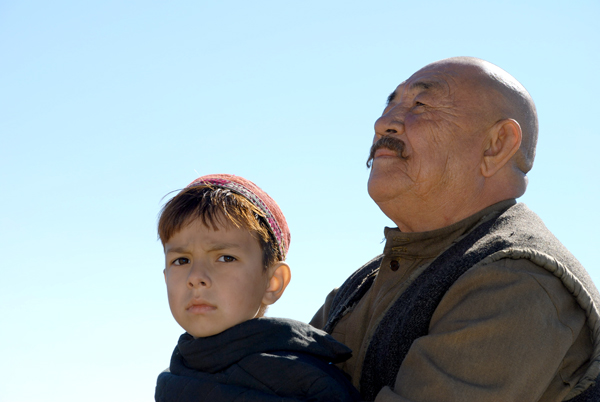|
Reviews of Recent Independent, Foreign, & Documentary Films in Theaters and DVD/Home Video

THE GIFT TO STALIN After playing on the festival circuit, The Gift to Stalin (2008) is getting a theatrical release in time for the 20th anniversary of Kazakhstan’s independence after the dissolution of the Soviet Union. While the Central Asian country came in for more than its share of mocking from Sacha Baron Cohen in Borat: Cultural Learnings of America for Make Benefit Glorious Nation of Kazakhstan (2006), it has recently produced notable films about difficult adjustments to change, including Gulshat Omarova’s Schizo (2004) and Sergey Dvortsevoy’s Tulpan (2008). The Gift to Stalin takes place more safely in the troubles of the past, 1949, when the republic was used as a vast prison (with and without walls) and a transit point for ethnic deportations and forced resettlements for religious and political exiles. Meanwhile, the non-Russian indigenous nomads were being disastrously forced into agriculture collectives, and scientists were (mis)using the endless steppe as a test site for rockets and atomic bombs. The film brings together all these elements as well as the preparations to celebrate Stalin’s 70th birthday, when he’d already been brutally running the U.S.S.R. for over a quarter of a century and was looking ahead to international hegemony. Despite this heavy-handed set-up, a charming story of finding love and humanity emerges among a motley crew not frequently seen in films about the Soviet Union or this period. A half-dead little boy, Sasha (Dalen Shintemirov, a charmer), is plucked out of a pile of discarded dead bodies from a packed convoy of Jews from Moscow, and his rescuer, an old local railroad worker, Kasym (Nurzhuman Ikhtymbayev), takes him home to his village. It’s pretty predictable that their relationship will gradually become like the mismatched pair in Claude Berri’s classic The Two of Us (1967), but they bond within the context of Sasha absorbing Kazakh cultural traditions—he’s renamed Sabyr by a shaman for protection. (A scene at the grave of the father of Kasym, a Muslim, is particularly moving.) However, Sasha, bullied by ragtag youth gangs, yearns to return to his city life and family even though he finds a comforting embrace in the Catholic faith and the idealistic hopes of the stranded men and women dissidents, who are cruelly tyrannized by the local policeman. Somehow, little Sasha becomes convinced that if he can just win a contest to speak directly to Papa Stalin on his birthday he will be granted his heart’s desire. The
harsh reality of Stalin’s regime isn’t quite as explicitly portrayed as
in the recent adventure drama
The Way Back, but it’s a frank component of this unusual childhood.
So an epilogue feels awkwardly tacked-on for PR value when the adult
Sasha reclaims his Jewish identity in Jerusalem and fondly pays tribute
to the people of Kazakhstan who saved his life. (The
producer/distributor runs the country’s national oil and gas company, TengizChevroil.)
Nora Lee Mandel
|

